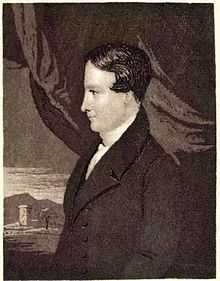Robert Murray M'Cheyne
| Robert Murray McCheyne | |
|---|---|
 Presbyterian minister and missionary | |
| Born |
21 May 1813 Edinburgh, Scotland |
| Died |
25 March 1843 (aged 29) Dundee, Scotland |
Robert Murray M'Cheyne (pronounced "Mak-shayn",[1] occasionally spelled as "McCheyne"; 21 May 1813 – 25 March 1843) was a minister in the Church of Scotland from 1835 to 1843. He was born at Edinburgh, was educated at the University of Edinburgh and at the Divinity Hall of his native city, where he was taught by Thomas Chalmers. He first served as an assistant to John Bonar in the parish of Larbert and Dunipace, near Falkirk, from 1835 to 1838. After this he served as minister of St. Peter's Church (in Dundee) until his early death at the age of 29 during an epidemic of typhus.
Not long after his death, his friend Andrew Alexander Bonar edited his biography which was published with some of his manuscripts as The Memoir and Remains of the Rev. Robert Murray M'Cheyne. The book went into many editions. It has had a lasting influence on Evangelical Christianity worldwide.
In 1839, M'Cheyne and Bonar, together with two older ministers, Dr. Alexander Black and Dr. Alexander Keith, were sent to Palestine on a mission of inquiry to the condition of the Jews. Upon their return, their official report for the Board of Mission of the Church of Scotland was published as Narrative of a Visit to the Holy Land and Mission of Inquiry to the Jews. This led subsequently to the establishment of missions to the Jews by the Church of Scotland and by the Free Church of Scotland. During M'Cheyne's absence, his place was filled by the appointment of William Chalmers Burns to preach at St. Peter's as his assistant.
M'Cheyne was a preacher, a pastor, a poet, and wrote many letters. He was also a man of deep piety and a man of prayer. He never married, but he did have a fiancée at the time of his death, Jessie Thain, who died heartbroken.
M'Cheyne died exactly two months before the Disruption of 1843. This being so, his name was subsequently held in high honour by all the various branches of Scottish Presbyterianism, though he himself held a strong opinion against the Erastianism which led to the Disruption. Bonar records, "And when, on the 7th March of the following year (i.e. 1843), the cause of the Church was finally to be pleaded at the bar of the House of Commons, I find him writing: 'Eventful night this in the British Parliament! Once more King Jesus stands at an earthly tribunal, and they know Him not!'" (Memoir {1892 ed.}, p. 147).
M'Cheyne designed a widely used system for reading through the Bible in one year. The plan entails reading the New Testament and the Psalms through twice a year, and the Old Testament through once. This program was included (in a slightly modified form) in For the Love of God by D. A. Carson (ISBN 0851115896) and is recommended by several Bible publishers, such as the English Standard Version and the New English Translation.[2]
Works
- Mission of Discovery Christian Focus Publications, ISBN 978-1-85792-258-5
References
- ↑ Miller, G M (1971). BBC Pronouncing Dictionary of British Names. London: Oxford University Press.
- ↑ NET Daily Reading Plans
Further reading
- Awakening – The Life and Ministry of Robert Murray McCheyne by David Robertson, Christian Focus Publications, ISBN 978-1-84550-542-4
External links
| Wikiquote has a collection of quotations related to: Robert Murray M'Cheyne |
- Robert Murray M'Cheyne Resources – new website
- The Biography of Robert Murray M'Cheyne by Andrew A. Bonar' at Project Gutenberg
- Robert Murray M'Cheyne: The Shining Light of Scotland by David Estrada, pages 28–37 in Christianity & Society, volume 14, no. 4, October 2004
- St Peter's Website
- McCheyne, McGonagall and the West End of Dundee – a lecture by David Andrew Robertson on 2010-06-21 as part of Dundee's WestFest celebrations.
- The Impact of McCheyne
- The Works of Rev. Robert Murray McCheyne: Writings and Lectures
- The Works of Rev. Robert Murray McCheyne: Sermons
- Narrative of a Mission of Inquiry to the Jews from the Church of Scotland in 1839
|